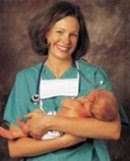
Source: http://www.público.es/
"Every birth should be assisted by a midwife. But this is not true anywhere Spain, "says the president of the Federation of Midwives of Spain (FAME), Natividad Astrain. According to the General Nursing Council, the professional association representing all nurses, and therefore the 6,500 specialized in midwifery, missing, approximately "40% more than professionals." The figure, the director of the Research Unit of the Council, Rafael Lletget, resulting in a deficit of more than 2,500 nurses trained in Obstetrics and Gynecology. Astrain
recalls that the lack of midwives endangers the implementation of the Strategy for improving normal delivery care, with which the Ministry of Health aims to reduce the number of caesarean sections and to help giving birth is an act more human and less medicalized.
Andalusia, which developed an initiative to promote normal birth, agrees to give importance to a sufficient number of midwives. Therefore, the Ministry of Health note that "only since 2005, the workforce has grown by around 10%."
Other regions such as the Balearic Islands, recognize the lack of specialist nurses to monitor the pregnancy and childbirth to attend. Attribute the deficit to increase in births to immigrant mothers. In the past five years, the number of midwives who are exercising has grown at a higher percentage (17%) than births (11%). But that has not been sufficient to solve a shortage of professionals who started two decades ago. Historic deficit
Lletget
Rafael explains that in Spain, between 1987 and 1992, "did not form any midwife." Before 1987, midwives were then called differently in each community. Then he decided to regulate specific training for midwives, nurse named academically in Gynecology and Obstetrics. However, specific training did not begin until 1992, when it convened for the first time the EIR, the equivalent MIR for nurses.
The Ministry of Health has established 10% more seats to specialize as midwife. In total, 454. However, autonomous regions, responsible for giving training courses, offered only 365 seats. According Lletget complaint, the reason for this difference is that training costs are borne by the communities.
In the last call, Cantabria, Castilla-La Mancha, Extremadura and Galicia have offered fewer training places in hospitals for which they were accredited, according to data from the Ministry of Health. Where most noticeable difference is in the cases of Madrid and Valencia: the Ministry were credited for 61 and 83 places respectively, but eventually only been offered 49 and 48. From
College of Nursing at Barcelona, \u200b\u200bhas been criticized on many occasions the lack of midwives who have Catalunya, despite being the second community that offers more training places, 74 in the last call.
The voice of the College of Midwives, Susana Garcia, an explanation: "Although this figure is increasing, 50% of people in Catalonia are coming from other communities and, therefore, once finished the specialty, return to their places of origin to work, leaving a significant shortfall here. "
recalls that the lack of midwives endangers the implementation of the Strategy for improving normal delivery care, with which the Ministry of Health aims to reduce the number of caesarean sections and to help giving birth is an act more human and less medicalized.
Andalusia, which developed an initiative to promote normal birth, agrees to give importance to a sufficient number of midwives. Therefore, the Ministry of Health note that "only since 2005, the workforce has grown by around 10%."
Other regions such as the Balearic Islands, recognize the lack of specialist nurses to monitor the pregnancy and childbirth to attend. Attribute the deficit to increase in births to immigrant mothers. In the past five years, the number of midwives who are exercising has grown at a higher percentage (17%) than births (11%). But that has not been sufficient to solve a shortage of professionals who started two decades ago. Historic deficit
Lletget
Rafael explains that in Spain, between 1987 and 1992, "did not form any midwife." Before 1987, midwives were then called differently in each community. Then he decided to regulate specific training for midwives, nurse named academically in Gynecology and Obstetrics. However, specific training did not begin until 1992, when it convened for the first time the EIR, the equivalent MIR for nurses.
The Ministry of Health has established 10% more seats to specialize as midwife. In total, 454. However, autonomous regions, responsible for giving training courses, offered only 365 seats. According Lletget complaint, the reason for this difference is that training costs are borne by the communities.
In the last call, Cantabria, Castilla-La Mancha, Extremadura and Galicia have offered fewer training places in hospitals for which they were accredited, according to data from the Ministry of Health. Where most noticeable difference is in the cases of Madrid and Valencia: the Ministry were credited for 61 and 83 places respectively, but eventually only been offered 49 and 48. From
College of Nursing at Barcelona, \u200b\u200bhas been criticized on many occasions the lack of midwives who have Catalunya, despite being the second community that offers more training places, 74 in the last call.
The voice of the College of Midwives, Susana Garcia, an explanation: "Although this figure is increasing, 50% of people in Catalonia are coming from other communities and, therefore, once finished the specialty, return to their places of origin to work, leaving a significant shortfall here. "
0 comments:
Post a Comment